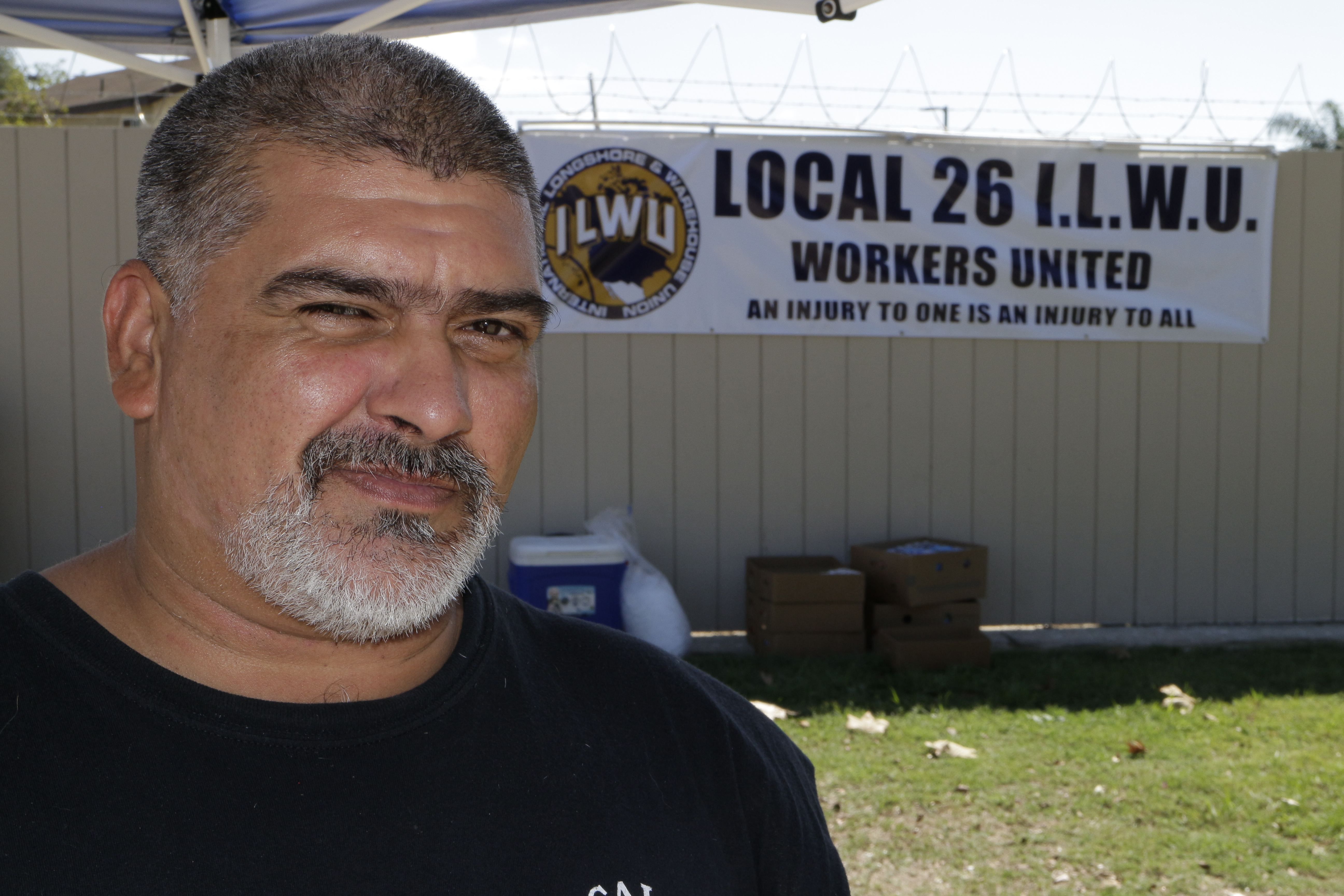Local 26 member David Gonzales is leading an impressive but quiet effort with other volunteers in Wilmington who serve hundreds of meals each week to homeless and hungry people in the harbor area.“I know what it’s like to be on the streets because I was there once myself,” says Gonzales, tracing his ordeal that began when he was physically and mentally abused almost daily by a stepfather “from the time I was 3 until I was 13.” When he was able to fight back, his mother said he’d have to leave the house, so he ended up in Banning Park. Gonzales tried to continue at school while he was living on the streets, but eventually dropped out and became involved with drugs and gangs.
“I can see now that the gang was important to me because I didn’t have a father, and it filled a need for a while,” he says. “Gang life gave me some security, but also filled my mind with distrust of anyone who wasn’t exactly like us. After years of “gangbanging” and coloring much of his skin with tattoos, he began to look for a way out of his dependency on drugs and the street life, but getting out was difficult. That’s where the union came in.
“I’m from a 4th generation Wilmington family here, so I knew how important the union was to the community, but I never realized that it would be the thing that helped me turn my life around.”
Gonzales found work as a guard with ILWU Local 26, providing security on the docks at the ports of LA and Long Beach. What he found was a surprising degree of support from co-workers who made a difference in his life.
“When my baby girl was just 9 months old, she had a life-threatening heart defect that required a dangerous surgery.” Gonzales said Local 26 union steward Mark Reyes offered to become her godfather, something “nobody had ever done for me and my family before.”
A similar act of kindness and compassion happened several years ago when he ended a difficult personal relationship and took full responsibility for his 7 children.
“It was holiday time and one of the union sisters at work, Christina Le Blanc who’s the Lead Sargent at Hanjin, asked me how I was planning to celebrate Christmas. I told her that it was going to be a little rough that year but that we’d be fine. She went out on her own and asked the other guards to pitch-in, and they made it possible for my kids to have something special during that difficult time.”
As the life of gang-banging and drug addiction was left behind, Gonzales says he now lives his life in recovery following a simple philosophy of what he calls “paying it forward.”
It started with an inspiration to buy boxes of frozen hamburger patties that he could grill for hungry people still stuck on the street. He quickly found others willing to help and says many of those volunteers were once living on the streets themselves during a difficult stretch. “We know what it’s like to be out there.”
Using Facebook, Gonzales has mustered a volunteer crew that prepares hundreds of sack lunches every Thursday, then distributes the meals to people living in the margins from Wilmington to LA’s Skid Row.
“We made 490 sack lunches last week and could have done a lot more but we just ran out of time,” he says, noting that groups and individuals are donating everything from bread and lunch meat, to their own labor. “We don’t have a formal non-profit group, but we do get the job done because everyone pitches-in to help the group that we call: ‘Heart of the Harbor/Helping Those in Need.’”
The group also helps with special needs or particular requests, such as one for diapers and wipes that was recently fulfilled with an online request to volunteers.
The biggest feeding effort so far took place on Saturday, October 3rd at Wilmington’s “Greenbelt Park,” between Watson and “L” Street. Volunteers began arriving at 7am to cook and prepare a hot lunch for hundreds from noon onward. Among the many helpers were several of Gonzales’ seven children who are regular volunteers.
The first volunteer to join Gonzales was Nikki Fabela, Wilmington resident and daughter of Local 13’s Paul Fabel. “She was the first person who said she’d help me,” said Gonzales, “and her gesture of kindness is something I’ll never forget.”
“We know there are at least 8 people who have gotten off the streets and turned their lives around because of our help,” says Gonzales, who points to the turnaround in his own life as proof that dramatic changes are possible.
Gonzales says that their project is open to everyone and is not part of a church, but he says they do try to pause at some point during the busy volunteer times to give thanks and reflect on the pain and suffering faced by so many in the world – and how volunteers can make a difference with love and action.
Gonzales emphasizes that their group is eager to partner with individuals and like-minded organizations who can provide resources such as transitional housing, mental health services and recovery/rehabilitation support.
“My 17 years in the union have provided me with so much support that made my turnaround and recovery possible,” he says, adding that it has also expanded his perspectives, noting that he’s been able to meet people from all over the world and get beyond the small-minded thinking and bigotry that came with life in a gang. “I now see that all of us have so much in common, instead of focusing on difference like I used to, about how people looked or talked. I am truly grateful to all of my union brothers and sisters who have shown me so much solidarity and positivity during my years on the waterfront.”

